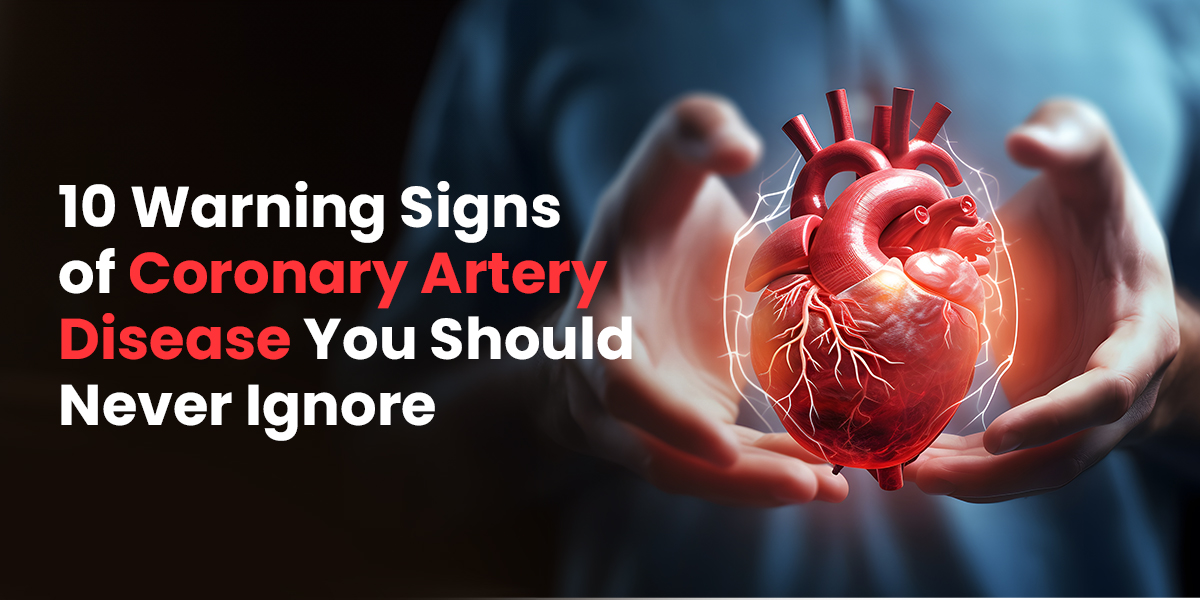10 Warning Signs of Coronary Artery Disease You Should Never Ignore

Our hearts are pretty amazing, like a tireless pump, they keep us going strong. But just like any motor engine, sometimes they need a little check-up and the trouble is, our hearts aren’t always the best at shouting warnings.
Coronary artery disease (CAD) is a bit of a villain when it comes to your heart. It narrows the main blood vessels (coronary arteries) that supply your heart muscle with life-giving blood. This narrowing happens because of a build-up of fatty deposits called plaque, kind of like cholesterol gunk clogging the pipes.
In this blog, we will be covering the warning signs of coronary artery disease.
1. Chest Discomfort
This one feels like a tightness, pressure, or squeezing in your chest. Imagine someone giving you an overly enthusiastic hug that takes your breath away. It usually shows up in the center or left side of your chest and might be triggered by excessive exercise or stress.
2. Breathlessness
Feeling winded after a walk you used to do with ease? That could be your heart saying, “Whoa, slow down a sec! I need more air!” The key is to pay attention especially if they appear suddenly and come with feeling anxious, short of breath, or sweaty.
3. Pain Beyond the Chest
Sometimes the pain plays hide-and-seek! It could travel to your arms, shoulders, back, jaw, or even your belly. This can also be due to indigestion but if it’s new or different, get it checked by your doctor.
4. Dizziness
Feeling faint or lightheaded can happen for many reasons, but if it’s a frequent visitor, it could be your heart not pumping blood as efficiently as it should. If you also feel a lack of energy during your regular chores then you should consult a doctor immediately, as these indicators can be a bigger health problem.
5. Sweats Out of Nowhere
Sweating for no reason, especially with other symptoms, shouldn’t be ignored. It might be your body’s way of saying, “Hey, the heart’s under pressure!” Frequent cold sweating can be a possible reason for the signs of a heart attack.
6. Puffy Ankles/Feet
Notice your ankles or feet seem puffier than usual? This could be fluid buildup due to heart problems. It happens when there is not enough blood supply to the lower limbs or it can also cause bloating due to abnormal blood flow in veins.
7. Cough Problems
While a cough by itself isn’t usually a sign of heart disease, it’s worth paying more attention if you already have heart problems. This could be a sign that your heart isn’t pumping as well as it should, causing fluid buildup in your lungs.
8. Skipping a Beat
It’s normal for your heart to speed up or even miss a beat sometimes, especially when you’re excited or nervous. But here’s what to watch out for Skipping for a While: If your heart skips a beat for more than a few seconds, that’s a good reason to see your doctor.
Frequent Skips and Dizzyness: Feeling like your heart’s missing beats often, and getting dizzy spells along with it? Then it could be a case of some serious problem. You should consult a doctor as soon as possible.
9. Throat and Mouth Pain
A sore throat or mouth pain on its own isn’t typically a heart issue. It’s more likely a cold, allergies, or even sinus problems. But here’s the key: if you have chest pain that spreads upwards to your throat and mouth, that could be a warning sign of a heart attack.
10. Unhealthy Stomach
Chest pain is a well-known sign of heart problems, but did you know an upset stomach can be a warning sign too? This can show up as a stomach ache, nausea, vomiting, or heartburn. Because these symptoms are often linked to the flu or a bad meal, they can be easily overlooked when it comes to heart health
Some symptoms of heart problems do not even occur in the chest, which makes it difficult to identify the real issue.
The scary part? Coronary artery disease often develops silently over many years. But there are some warning signs to watch out for, like chest pain and shortness of breath. If the blockage gets bad, it can even lead to a heart attack.
The good news? There are ways to fight back! Doctors can use medications and sometimes even surgery to keep your arteries clear. And even better, you can take steps to prevent CAD in the first place by eating healthy, exercising regularly, and ditching cigarettes.

 Call-an-Ambulance
Call-an-Ambulance



